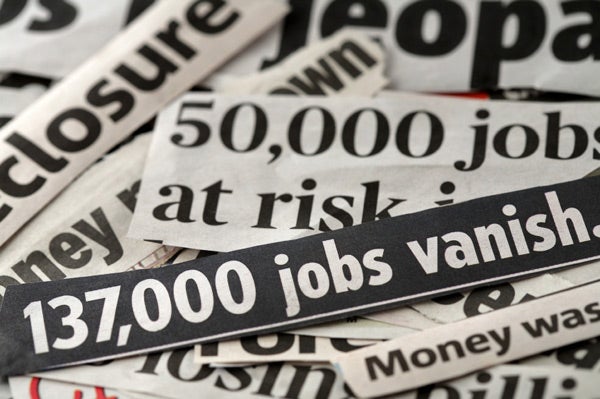|
October 12, 2012
Stanford Center on Poverty and Inequality unveils new 'Recession Trends' website
The Recession Trends website offers analysis of the recession's effects. It also allows visitors to construct their own charts using a wide variety of social and economic data sets. By Max McClure

The most troubling effects of the recession are on inequality itself, said David Grusky, a professor of sociology at Stanford and director of the Stanford Center on Poverty and Inequality. (Photo: iStock.com)
President Obama refers to poverty as "a moral issue." Mitt Romney talks about alleviating the plight of the poor as the "kind acts" that reveal "the good heart of America." Both presidential candidates, in other words, frame poverty in terms of ethics.
David Grusky, a professor of sociology at Stanford and director of the Stanford Center on Poverty and Inequality (CPI), doesn't disagree with this viewpoint, but he does think it's incomplete.
"We're entering entirely new territory, a level of inequality that hasn't been seen since the first Gilded Age a century ago," he said. "It's not just whether we care about the poor and their suffering, it's whether we can still run a productive economy and avoid a major social fallout when so many are cut off from opportunity."
Poverty and inequality are, in other words, creating social "externalities" – costs that we all collectively bear – particularly so in the wake of a recession. Although recent job numbers have been encouraging, the 2008-2012 downturn is now viewed as the United States' worst economic crisis since the Depression.
The new Recession Trends website from the CPI – one of three National Poverty Centers – delivers 16 "Recession Briefs" authored by some of the country's top scholars that lay out the economic and social fallout of the recession. Is crime increasing during the downturn? Is U.S. health deteriorating? How has immigration responded?
In addition to these briefs, the Recession Trends initiative – a joint project with the Russell Sage Foundation – acts as a new clearinghouse of data on hundreds of social and economic trends, ranging from housing to crime to mental health. Visitors can use the site's time series to construct their own charts and compare social factors side by side.
"Because these basic data on the recession and its effects have often been collected with public money," Grusky said, "the public has a right to know what's happening to our country as the recession plays out."
Rising poverty and inequality
According to Grusky, the most troubling effects of the recession are on inequality itself.
"There's been lots of speculation that this recession would, like the Great Depression, work to reduce inequality by hurting those at the top most," he said. Instead, as in every other postwar recession, the recession has hit those at the bottom the hardest, while those at the top have been relatively buffered.
According to the brief written for the site by Timothy Smeeding, the director of the Institute for Research on Poverty at the University of Wisconsin-Madison, the top-earning 20 percent of households earned nearly half of all U.S. income by the end of the recession in 2009 – an all-time high.
Meanwhile, from 2007 to 2011, the poverty rate increased from 12.5 percent to 15 percent – similar to levels seen in the early 1980s and 1990s.
That the result wasn't worse was largely due to government stimulus spending, which, Grusky said, "tamped poverty down to the level of other recessions."
As pointed out in another brief by economist Robert Moffitt of Johns Hopkins University, although not all social safety net spending increased during the recession, large upticks in unemployment insurance expenditures, the Supplemental Nutrition Assistance Program (food stamps) and the Earned Income Tax Credit played a major role in reducing poverty.
Social fallout
The broader effect of these rises in poverty and inequality can be difficult to measure.
The recession has so far shown no dramatic immediate effects on the nation's health. It's even possible that it may lead to some improved health outcomes. A classic example is that newly fuel-conscious car owners drive less, leading to fewer accidents.
There are, however, what Grusky calls "hints of trouble down the road."
According to a brief from University of Michigan sociologist Sarah Burgard, the rate of serious psychological distress among 25-44 year olds has increased to 3.3 percent from the preceding decade's more-or-less constant rate of 3 percent.
Asthma rates among black children had risen from 12-13 percent to 17 percent by 2009. There have been sharp increases in forgone medical, dental and prescription eyeglass and medication purchases.
Although crime rates haven't gone up overall, there are suggestive increases in some types of crime, such as burglary, that may be recession-generated.
If some social costs are hard to tease out, the economic ones are often straightforward. As Grusky put it, "By running a society in which those born into poverty are typically cut off from the economy, we're wasting human talent, lowering the GDP – and all of us are the worse for it."
In the spring of 2013, the Stanford Center on Poverty and Inequality will produce its first annual National Report Card on Poverty and Inequality, evaluating how well the country is addressing poverty, inequality and opportunity.
"Although the country regularly monitors GDP and other measures of the total size of the economic pie, it doesn't focus nearly as much attention on changes in how that pie is being distributed, who's doing well, who's losing out, and why," said Grusky.
-30-
|